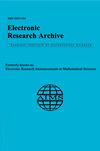Tunicate swarm algorithm with deep convolutional neural network-driven colorectal cancer classification from histopathological imaging data
IF 1
4区 数学
Q1 MATHEMATICS
引用次数: 4
Abstract
Colorectal cancer (CRC) is one of the most popular cancers among both men and women, with increasing incidence. The enhanced analytical load data from the pathology laboratory, integrated with described intra- and inter-variabilities through the calculation of biomarkers, has prompted the quest for robust machine-based approaches in combination with routine practice. In histopathology, deep learning (DL) techniques have been applied at large due to their potential for supporting the analysis and forecasting of medically appropriate molecular phenotypes and microsatellite instability. Considering this background, the current research work presents a metaheuristics technique with deep convolutional neural network-based colorectal cancer classification based on histopathological imaging data (MDCNN-C3HI). The presented MDCNN-C3HI technique majorly examines the histopathological images for the classification of colorectal cancer (CRC). At the initial stage, the MDCNN-C3HI technique applies a bilateral filtering approach to get rid of the noise. Then, the proposed MDCNN-C3HI technique uses an enhanced capsule network with the Adam optimizer for the extraction of feature vectors. For CRC classification, the MDCNN-C3HI technique uses a DL modified neural network classifier, whereas the tunicate swarm algorithm is used to fine-tune its hyperparameters. To demonstrate the enhanced performance of the proposed MDCNN-C3HI technique on CRC classification, a wide range of experiments was conducted. The outcomes from the extensive experimentation procedure confirmed the superior performance of the proposed MDCNN-C3HI technique over other existing techniques, achieving a maximum accuracy of 99.45%, a sensitivity of 99.45% and a specificity of 99.45%.基于深卷积神经网络的结直肠癌组织病理影像分类的被囊虫群算法
结直肠癌(CRC)是男性和女性中最常见的癌症之一,发病率不断上升。来自病理实验室的增强分析负荷数据,通过计算生物标志物,与描述的内部和内部变异相结合,促使人们寻求结合常规实践的强大的基于机器的方法。在组织病理学中,深度学习(DL)技术已被广泛应用,因为它们具有支持分析和预测医学上适当的分子表型和微卫星不稳定性的潜力。考虑到这一背景,目前的研究工作提出了一种基于组织病理成像数据的基于深度卷积神经网络的结直肠癌分类元启发式技术(MDCNN-C3HI)。本文提出的MDCNN-C3HI技术主要通过组织病理学图像对结直肠癌(CRC)进行分类。在初始阶段,MDCNN-C3HI技术采用双边滤波方法来去除噪声。然后,提出的MDCNN-C3HI技术使用带有Adam优化器的增强胶囊网络来提取特征向量。对于CRC分类,MDCNN-C3HI技术使用DL改进的神经网络分类器,而束状虫群算法则用于微调其超参数。为了证明所提出的MDCNN-C3HI技术在CRC分类方面的增强性能,进行了广泛的实验。广泛的实验过程的结果证实了MDCNN-C3HI技术优于其他现有技术的性能,达到了99.45%的最高准确度,99.45%的灵敏度和99.45%的特异性。
本文章由计算机程序翻译,如有差异,请以英文原文为准。
求助全文
约1分钟内获得全文
求助全文

 求助内容:
求助内容: 应助结果提醒方式:
应助结果提醒方式:


